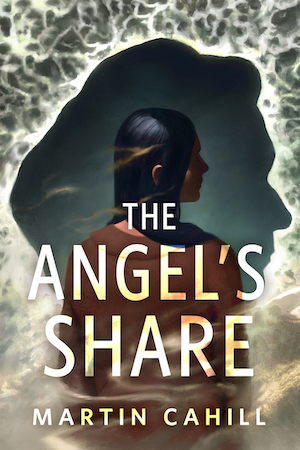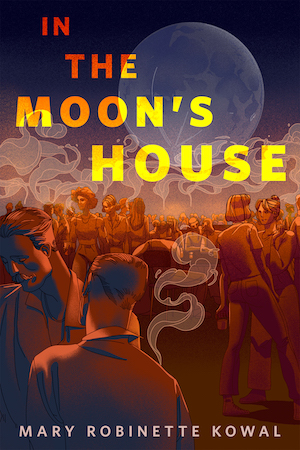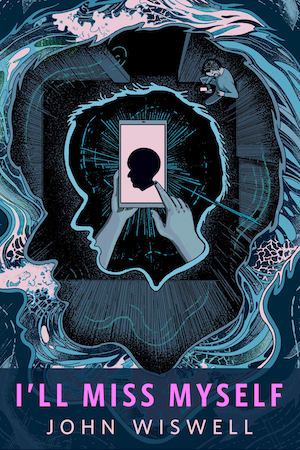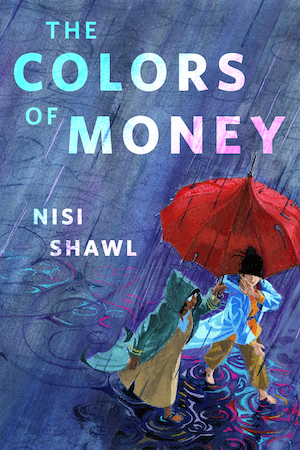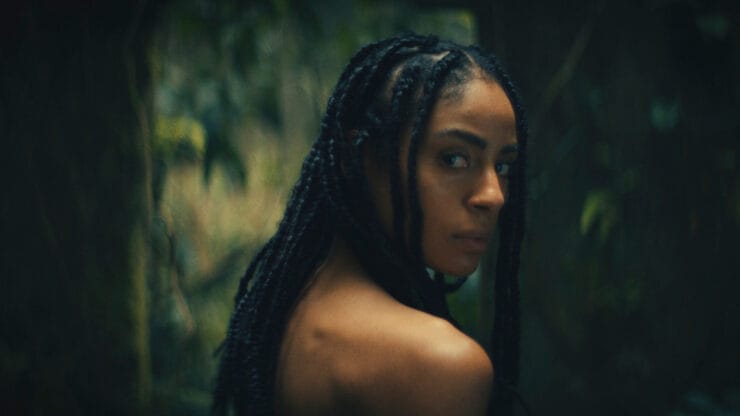Episode five marks the show’s divergence from and expansion of Victor LaValle’s original novel. Much of what we see of Emma’s story is only hinted at or mentioned briefly in the book. Here, showrunner and script writer Kelly Marcel takes us along Emma’s trip to Brazil, to meeting the bruxa and the photographer, to motherhood and finding the witches. Let’s take a journey with Apollo down the rabbit hole, through the looking glass, and out the other side of the wardrobe.
This episode is the perfect example of why I love it when filmed adaptations move beyond the structure of the source material. The show can jump around in time and space and play with visuals in a way the text can’t. As much as I’ve enjoyed the show so far, it’s exciting to finally encounter something I can’t anticipate. I know how Emma gets from point A to point B, but Marcel shows us everything in between that we didn’t know or could only speculate on. This detour is needed. Emma as a character has been rather two dimensional up to this point. Incredibly well acted by Clark Backo, but still seen from a distance.
Buy the Book
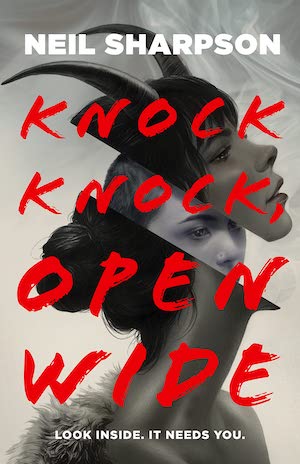

Knock Knock Open Wide
I think it’s an intentional choice rather than accidental or circumstantial. So far, the show, like the book, has mostly been from Apollo’s perspective. He is on the posters for the show, his life and thoughts and feelings suck up most of the air in the room, and it’s through his eyes that we have seen Emma change. To Apollo, the woman he loved is gone. She descended into hysteria, committed a terrible sin, and now he needs to face her. He came to that island wanting revenge, but after the events of the previous episode, it seems more like he just needs closure from her. But it’s still all about him. So it makes sense that up until now, the Emma we’ve seen is so surface level. It’s telling that the parts of Emma’s life we see, the parts that build her out into this thoroughly complex and fascinating creature, are the ones without Apollo in it. She gets to tell her own story here.
Backo, by the way, deserves an Emmy for that look on her face when she stares down the camera. She oozes sorceress. She’s a baby Baba Yaga and doesn’t even know it yet. Lakeith Stanfield has been fantastic as Apollo, but Backo is a revelation. Her microexpressions, the way she can act with just her eyes, amazing. On a side note, I feel like the sorceress photograph was referencing a known painting, but for the life of me I can’t place it. If you recognize the reference, let me know in the comments.
Cal takes Apollo on a grand tour of the island. At night, the island felt abandoned and ruined, but in the morning it’s bursting with life and laughter. Children play and attend school, residents tend the grounds and read books in Emma’s makeshift library. Apollo and William are the only men on the island because, as Cal reveals, all of these women experienced the same trauma as Emma. They all discovered their babies weren’t their babies. Some were lucky enough to have other children to protect, but others are alone now. Cal offers them all safety from a world that has declared them hysterical and mad and wants to lock them up. Even the woman Apollo accused of threatening to kill her baby at the group therapy session has found refuge there.
Some women, like Greta, also dealt with abusive husbands. Apollo begins to see himself the way these women see him instead of how he sees himself. He catches himself treating them like monsters and bad mothers instead of women who had all of their choices taken away by men. Our society blames mothers and wives for the actions of the men in their lives—What was she wearing? Why didn’t she just leave? Why didn’t she do more to make him happy? She should have been nicer to him. She should smile more.—and then punishes them for trying to break free. The patriarchy is a helluva drug.
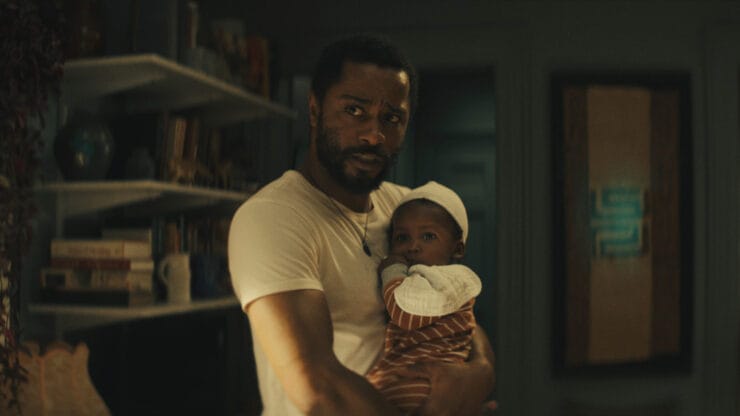
Greta doesn’t spill her whole story to Apollo, but he hears enough to know William has been playing him. She’s no wicked witch who stole his children away but a mother desperate to save her surviving daughter. We don’t yet fully know the connection between “it’s not a real baby” and what William did to Agnes, but one thing is certain: Greta hates her husband and is terrified of him in equal measure. Apollo also learns that not only did he let the wolf into the hen house, so to speak, but he also directly, albeit unintentionally, contributed to William continuing to harm Greta. He may not have understood what his role was in William’s plan, but he took up arms with him of his own volition. He chose not to ask questions or to verify anything William said. He saw what he wanted to see and believed what he wanted to believe, and now he must confront the consequences.
Remember what I said in my review of the previous episode about how this is a story about stories? As Cal points out in this episode, Apollo isn’t the only one trapped in the fairy tale from hell. Emma and Apollo both seem to have been destined for this moment in that way that all children in fairy tales are. Emma losing her parents set her adrift, driving her to wander the planet in search of something, which brought her to the bruxa, the photographer, William, and Apollo. Brian gave Apollo a book that turned out to be true and bound him (metaphorically) to a god, thus granting him access to the island in the first place. A fairy tale never starts right at the heart of the action, but there’s often a sense that the protagonists’ paths were set long ago by forces they cannot control. If William hadn’t spotted Emma’s photograph in Norway, something else would have drawn him to them. He is a wolf wearing the clothes of a dead grandmother waiting for his victims to traipse by.
However, Emma and Apollo are also each wading through two fairy tales, one where they’re the hero and one where they’re the villain. Emma is the innocent daughter cast into the woods or the princess stolen from her parents, but she’s also the wicked witch doing the stealing. Apollo is the child who sets off on a quest to save the people he cares about or the brave knight who slays the dragon, but he’s also the man who chooses his own happiness at the expense of someone else. I think about the story of Sleeping Beauty where a man placed himself at the center of it by deciding he was entitled to do what he wanted to her body, about how her story is framed as a rescue and happy ending even though her life was spent having her choices taken away from her. Apollo is at a crossroads. He can choose the path William has, that of the prince who calls himself the hero even as he pillages everything good around him, or he can turn towards where Cal is leading and be the poor little nobody who faces down a great evil. Apollo and Emma’s stories started long ago. The plots are intertwined now, and the end is closer than they realize.
Next week marks episode six, and given that we still have about half the book left, I’m guessing the story won’t wrap up with the finale. It’s too much story to resolve in three episodes. So much happens in the latter half of the book that Marcel could easily do a whole second eight-episode season. I could quibble about some elements of this episode, but overall I thoroughly enjoyed it and can’t wait to see what comes from the final William reveal.
Alex Brown is a Hugo-nominated and Ignyte award-winning critic who writes about speculative fiction, librarianship, and Black history. Find them on twitter (@QueenOfRats), bluesky (@bookjockeyalex), instagram (@bookjockeyalex), and their blog (bookjockeyalex.com).


